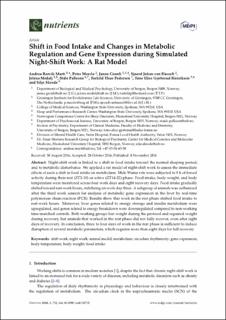| dc.contributor.author | Marti, Andrea Rørvik | |
| dc.contributor.author | Meerlo, Peter | |
| dc.contributor.author | Grønli, Janne | |
| dc.contributor.author | Hasselt, Sjoerd van | |
| dc.contributor.author | Mrdalj, Jelena | |
| dc.contributor.author | Pallesen, Ståle | |
| dc.contributor.author | Pedersen, Torhild | |
| dc.contributor.author | Henriksen, Tone Elise Gjøtterud | |
| dc.contributor.author | Skrede, Silje | |
| dc.date.accessioned | 2021-08-09T12:44:13Z | |
| dc.date.available | 2021-08-09T12:44:13Z | |
| dc.date.created | 2017-01-02T14:59:55Z | |
| dc.date.issued | 2016 | |
| dc.identifier.issn | 2072-6643 | |
| dc.identifier.uri | https://hdl.handle.net/11250/2767042 | |
| dc.description.abstract | Night-shift work is linked to a shift in food intake toward the normal sleeping period, and to metabolic disturbance. We applied a rat model of night-shift work to assess the immediate effects of such a shift in food intake on metabolism. Male Wistar rats were subjected to 8 h of forced activity during their rest (ZT2-10) or active (ZT14-22) phase. Food intake, body weight, and body temperature were monitored across four work days and eight recovery days. Food intake gradually shifted toward rest-work hours, stabilizing on work day three. A subgroup of animals was euthanized after the third work session for analysis of metabolic gene expression in the liver by real-time polymerase chain reaction (PCR). Results show that work in the rest phase shifted food intake to rest-work hours. Moreover, liver genes related to energy storage and insulin metabolism were upregulated, and genes related to energy breakdown were downregulated compared to non-working time-matched controls. Both working groups lost weight during the protocol and regained weight during recovery, but animals that worked in the rest phase did not fully recover, even after eight days of recovery. In conclusion, three to four days of work in the rest phase is sufficient to induce disruption of several metabolic parameters, which requires more than eight days for full recovery. | en_US |
| dc.language.iso | eng | en_US |
| dc.publisher | MDPI | en_US |
| dc.rights | Navngivelse 4.0 Internasjonal | * |
| dc.rights.uri | http://creativecommons.org/licenses/by/4.0/deed.no | * |
| dc.title | Shift in Food Intake and Changes in Metabolic Regulation and Gene Expression during Simulated Night-Shift Work: A Rat Model | en_US |
| dc.type | Journal article | en_US |
| dc.type | Peer reviewed | en_US |
| dc.description.version | publishedVersion | en_US |
| dc.rights.holder | Copyright 2016 by the authors | en_US |
| dc.source.articlenumber | 712 | en_US |
| cristin.ispublished | true | |
| cristin.fulltext | original | |
| cristin.qualitycode | 1 | |
| dc.identifier.doi | 10.3390/nu8110712 | |
| dc.identifier.cristin | 1419366 | |
| dc.source.journal | Nutrients | en_US |
| dc.identifier.citation | Nutrients. 2016, 8 (11), 712. | en_US |
| dc.source.volume | 8 | en_US |
| dc.source.issue | 11 | en_US |

